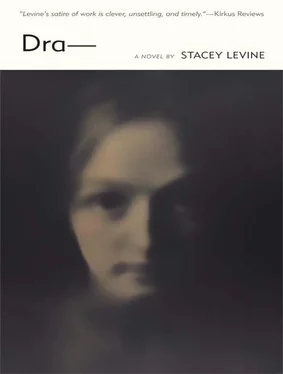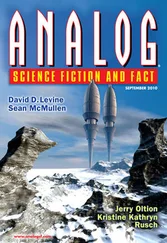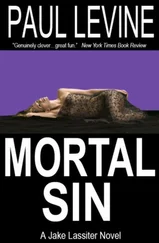She stepped into the car and sat on a bench, thoughts still on the Nurse, and she began to plan, as before, the complex visit with the woman that would ensue after she, Dra—, settled into the new job. This visit would be different from all other visits, she conceded to herself: arriving on a train would be dramatic. And fully absorbed by the thought of stepping from the train and into the Nurse’s arms, she realized how such a visit, lengthy and absorbing, would work to bring the two of them much closer than ever before. But she was unable to imagine that specific scenario, so in discomfort raised her purse to her face, holding it there.
She began to wonder if she should delay her trip to the pump site just a bit longer and run right now to find a train that would speed directly to the Nurse’s compound, so she and the Nurse might have a single, though rushed visit. The brevity of such a visit would create intensity and urgency, and from the dark confines of this point, Dra— would be able to say all sorts of unimaginable things to the Nurse, lush, formless words that would emanate from her so easily and in such great numbers because they would be true, and because she would utter them not now, but in the future.
She might also tell the Nurse of the back-ache, and of other symptoms, too, including her nagging dreams of thin excrement trails, and listening, the Nurse’s face would grow furrowed with concern, whereupon the two of them would exchange significant glances and the afternoon would lapse; and after that single perfect moment, Dra— would touch her own face as lightly as if the skin were water or the Nurse’s own face, then without a word she would rise and leave the room, possessing enough strength to head for the pump site, the place she must go to begin the new life she was so anxious to begin.
Stopping first to visit the Nurse might make this long journey bearable, Dra— contemplated, sitting there in the quiet row of seats, yet she was unable to get up and leave. She longed for the train to rock into motion, because that might disperse the suffocating stench of the car, which consisted of petroleum and, it seemed, egg.
She looked up in surprise to see a matronly conductor in a uniform strolling down the aisle of the train, chewing on something dark, perhaps a meat stick. Smiling to herself, the conductor took a seat on the bench opposite, legs spread, elbows on knees, and, chewing, swallowing, asked openly, “Why are you on this train?”
Looking away, Dra— stated wearily that her primary destination was the pump site, yet under the conductor’s arch stare, she finally added with discomfort that she did not want to go to the pump site at all, despite the fact that it would mark the beginnings of a lengthy and fruitful career. The truth, she stated monotonically, was that she had wanted, deeply, only, and for so long to visit the Nurse, nothing more, due to lonesomeness, and that this lonesomeness functioned like a vise to keep her tied to the Nurse in a pitiful way, and from this there was no respite.
The conductor removed a bottle from her pocket and squeezed a thick daub of lotion into her palm. “So, you are predisposed to feeling blue. What of it? Blue is not the worst thing,” she said, calmly rolling the lotion between her hands until it thickened into the shape of a stick; this she set gently against the wall of the train car and continued her thoughts. “My question is, why do you want to see this Nurse before reporting to work?”
Dreamily staring out the window, Dra— recounted the spidery, shadowy ache far inside her back, and how it shifted like a man’s voice inside her and made her notice her own body in unpleasant, unprecedented ways; it made her insignificant, she further revealed, and it required attention from the Nurse. All was worrisome, she added, rushing to complete these sentences, though afterward she fell silent before the staring conductor as again her mind flooded in torrents back to the Nurse.
“A back-ache is not so outrageous,” the conductor answered flatly. “We’ve only been standing upright for two million years — and that’s not terribly long, is it? Now, what is this ache really about? Could it be about, say, fears? You want relief from life’s fears and uncertainties, I think. That is babyish.”
Staring blankly past the conductor, Dra— said that in addition to the back-ache, she sometimes heard intermittent whistling sounds that seemed to come from the very bones of her body, sounds that possessed an urgency quite distinct from her own. Though she fought not to hear the whistling, she had heard it often lately, and it actually had the musical properties of many tiny, diamond-like melodies. The sound was difficult to quiet down once it began, she explained, though usually she managed to dispel for a while with sleep or, at least once, with a laxative. She had not heard the whistling for several weeks, she admitted to the conductor, but if it began again, it surely would require frank professional care, possibly surgery. If she tried to describe the whistling to the Nurse over the phone, she told the conductor, the Nurse might laugh in disbelief; so for sheerly practical reasons, Dra— did not want the whistling to disappear altogether, at least not until the Nurse could hear it too.
The conductor stared, and pulling lint from her dark-blue trouser leg said, “Let me tell you something. We think we understand our bodies but we do not. Every day of our lives we feel sensations that we will never understand. This is true for the brain too — that is, we think we have clear memories, but we don’t. Memories aren’t true! They’re made-up pictures that help make our lives like a story. And the sensations in our bodies, well, those are little ruses, you see. Oh, I think it’s delightful! No one really knows what a body can do, or what it’s ever doing.”
“Some people know,” she said.
“Maybe they do,” the conductor said. “But that would be rare. And you — you can’t even tolerate the thought of a little sore in the small of your back, can you!” She fixed a calm, steady stare upon Dra—. “Why don’t you change? After all, when a person changes, the people around them change too, and then that person changes all the more. Wouldn’t you like to be part of something like that?”
“But how?” she answered sorrowfully, mind casting about emptily.
“Do you expect me to do everything for you? I’m not a machine! Though people seem to think I am,” she said, smiling, shaking her head, and she stood. “Oh, I meet all sorts of people every day, right and left, and we have the most wonderful little chats like this. I can’t imagine anyone not wanting that in life. Can you?”
She shook her head.
“Now, can you think of something pleasant to do with yourself while you wait for your Administrator?”
“Yes.”
“Good,” the conductor nodded in return, pulling a matchstick from her pocket, chewing on it. “Fret no more. Go home, fry an egg, climb into bed and think pleasant thoughts. This train is not traveling where you think, anyway; it will run into the mountains, which are frozen tonight. There we will stop to fetch a cache of beef and won’t arrive at your Nurse’s compound for several days, if at all. On the way, the train will fly so high off the ground it would probably upset someone like you. Your worksite — that’s the place you need to go. I’m not much older than you, am I? But I carry myself as if I were older,” the conductor remarked and left, tossing the matchstick over her shoulder.
Heaving a great, blowing breath of disappointment, Dra— stepped heavily from the train, purse hanging from her hand, and passed through the high-domed, empty station. She first despaired of seeing the Nurse any time soon, then realized there would be nothing wrong with finding a phone at any time, even now, and calling her — not to make an appointment, of course, but just to say hello, and, possibly, at the outside, to discuss some light personal matters. And if the phone call actually went well, she thought, it might mean that she could ask the Nurse to come pick her up in an airplane and take her away.
Читать дальше












